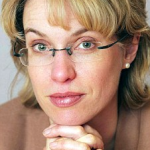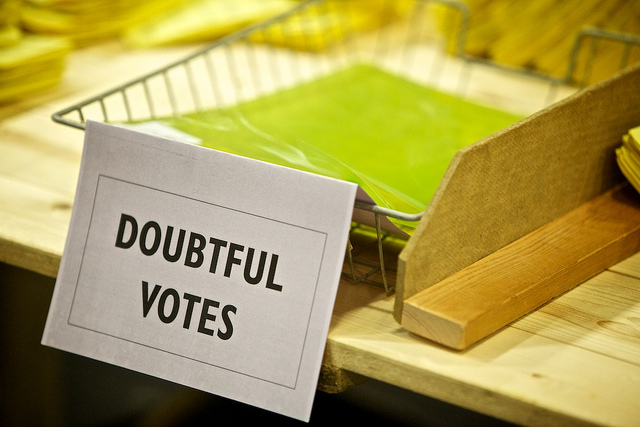The Electoral Commission’s Jenny Watson on votes at 16, information for voters, and modernising our electoral infrastructure
The Electoral Commission is the public body responsible for regulating party and election finance and setting standards for UK elections. In the second part of a two part Q&A with Democratic Audit’s Sean Kippin, The organisation’s Chair, Jenny Watson discussed modernising our electoral infrastructure, the Electoral Commission’s remit, and the standard of electoral information availability.
What steps are being taken to modernise electoral administration in advance of what could potentially be an extremely tight General Election next year?
An absolutely crucial step has already taken place! Some voters at the last General Election were prevented from casting their vote because they were in a queue at a polling station at 10pm. The law prevented them from receiving a ballot paper. We didn’t think that was right, and called on the Government to change the law so that anyone waiting to vote at a polling station at 10pm would be allowed to vote at the next General Election, and Parliament changed the law in 2013. In fact the next elections on May 22nd are the first time that voters throughout the UK will benefit from this change.
There’s also a change that’s important for overseas voters – postal votes can be sent out earlier, allowing more time for people overseas to complete them and return them in time to be counted.
But probably the most significant change is that from June, we will be able to register to vote online. That drags at least part of our system into the modern world and will make a huge difference to many people. It will also make things easier for organisations like Bite the Ballot, NUS and Operation Black Vote who want to run campaigns to encourage people to register to vote.
Could a greater degree of automaticity be added to registering to vote? For example, could signing up to pay Council Tax or receive benefits entail a requirement to register? Should it be made easier?
The move to Individual Electoral Registration will certainly make registration more accessible and more secure. You no longer need to rely on the outdated 19th century concept that a single ‘head of household’ is responsible for registering everyone. And, for the first time, under this new system people will be able to register online, which we believe will be particularly helpful for younger people.
Many local authorities are already using the data they hold about things like council tax or housing benefit more effectively to ensure that they invite people to register to vote.
16 and 17 year olds will be able to vote in the forthcoming Scottish independence referendum. Are there any implications for future UK elections? And if so, what are they?
It’s for the relevant Government to decide the franchise for elections and referendums specifying who is eligible to vote at them. No doubt everyone, ourselves included, will pay particular attention to the turnout amongst 16 and 17 year olds at the Scottish independence referendum, and also their experiences of casting their vote for the first time.
We are already running a targeted campaign at this age group in Scotland to ensure they know what they need to do to register to vote. I’m sure there will be lessons for all of us that would need to be taken on board before there were any moves to lower the voting age.
What is your view on the conclusions of a recent Democratic Audit report which said that a lack of decent, accessible electoral information is a barrier to engaging young people in the political process?
Information might help – but I don’t think it’s an easy answer to engaging young people in the political process. The Political and Constitutional Reform Select Committee’s inquiry into participation is hearing a lot of evidence at the moment that shows this isn’t a simple problem to solve. That said, the Electoral Commission is always looking at new ways of presenting its data and we are considering the findings of the Democratic Audit report. What I would say is that the Commission publishes a whole host of information – particularly around donations to political parties and candidate spending in the interest of transparency for voters.
So for example, here you can see how much each of the thousands of candidates that took part at the last General Election spent. Also, we are trialling ‘data visualisation’ to the way we present quarterly donation figures to political parties, making it more interactive for the public. You can check it out here.
In terms of elections data, members of the public can see quite a detailed breakdown of how votes were cast at an election in their area via our website. We not only compile turnout figures, but also how many postal vote and proxy vote applications were requested and returned for example. That’s all available here. And if you want to know when the next elections are in your local area, you can visit www.aboutmyvote.co.uk which will also tell you how to get on the register, or apply for a postal or proxy vote if you need it.
A recent journal article found that weekend voting increases turnout at European Elections by 10%. Do you think that introducing weekend voting is either practical or desirable?
This is one option that could be part of a more modern electoral system in this country and we will consider its merits as part of our work post 2015.
Do you think the Electoral Commission and our political system more widely would benefit from your organisation being granted a wider remit? For example running elections centrally, appointing returning officers, and collecting greater quantities of election result data?
We conduct surveys after every set of major elections and voters have told us for the last two or three years (90% last time out) that they are satisfied with the process of voting and that’s testament to the hard work that electoral administrators put in every year. So, whilst we want to continue seeing better co-ordination and consistent service for voters from Electoral Registration Officers and Returning Officers and we’ll work hard to ensure that happens, it looks as if our current decentralised system is achieving change.
The Electoral Commission already has the powers to run a UK-wide referendum centrally – most recently we did so for the 2011 referendum on the UK Parliamentary voting system which was the first time that data about the costs of a poll was collected and published in a completely transparent way. You can find it here. It would be good if Government adopted this practice for every election. For example, we’d like to see the publication of the costs of holding the last Police and Crime Commissioner elections.
What we’d like to see is the Government commit to having, and passing, legislation in place a minimum of six months before any poll takes place. That gives the whole electoral community the time to properly plan for a poll and is ultimately in voters’ interests.
Democratic Audit have been particularly interested in the information available about election outcomes. As I have explained already, the Electoral Commission publishes a wide range of data about elections, including the results of many major polls. But we will pick up a point that Democratic Audit have raised about how Returning Officers publish the outcomes of their local polls.
Indeed, one of the things that we called for at the 2012 Police and Crime Commissioner (PCC) elections was for Police Area Returning Officers to publish the results of the election on their local authority website so that voters could see who’d won and what the turnout was. In most cases did not happen – but it wasn’t a legal requirement. So we’re calling for the law to be changed ahead of the 2016 PCC elections so that this information is posted online in future.
—
Note: This post represents the views of the author and not those of Democratic Audit. This is part two of a two part interview, the first part can be found here. Please read our comments policy before posting. The shortened URL for this link is: https://buff.ly/1l3KCfK
—
 Jenny Watson is the Chair of the Electoral Commission. She is also a non-Executive Director of WRAP (Waste and Resources Action Programme) and a trustee of the charity Money Advice Trust. She is Chair of the Independent Complaints Panel at the Portman Group. She was the last Chair of the Equal Opportunities Commission prior to the creation of the Commission for Equality and Human Rights, and is a past Deputy Chairman of both the Banking Code Standards Board, and of the Committee on Radioactive Waste Management. She has also worked in a number of human rights organisations, including Liberty and Charter88.
Jenny Watson is the Chair of the Electoral Commission. She is also a non-Executive Director of WRAP (Waste and Resources Action Programme) and a trustee of the charity Money Advice Trust. She is Chair of the Independent Complaints Panel at the Portman Group. She was the last Chair of the Equal Opportunities Commission prior to the creation of the Commission for Equality and Human Rights, and is a past Deputy Chairman of both the Banking Code Standards Board, and of the Committee on Radioactive Waste Management. She has also worked in a number of human rights organisations, including Liberty and Charter88.






 Democratic Audit's core funding is provided by the Joseph Rowntree Charitable Trust. Additional funding is provided by the London School of Economics.
Democratic Audit's core funding is provided by the Joseph Rowntree Charitable Trust. Additional funding is provided by the London School of Economics.
nike tn
Hi! I just want to offer you a huge thumbs up for your great information you’ve got right here on this post. I will be returning to your site for more soon.|
sac boy chanel occasion
You made some good points there. I looked on the web for additional information about the issue and found most people will go along with your views on this web site.|
chaussures mercurial
Hello, I read your new stuff daily. Your story-telling style is awesome, keep up the good work!|
sac jumbo chanel
I visited multiple sites but the audio quality for audio songs present at this web site is in fact excellent.|
The Electoral Commission’s Jenny Watson on votes at 16, voter information, & modernising our electoral infrastructure https://t.co/WwmMWuIqQ4
RT @democraticaudit: The Electoral Commission’s Jenny Watson on votes at 16, voter information & modernising our electoral infrastructure h…
Electoral Commission’s Jenny Watson on #votesat16, info for voters and modernising our electoral infrastructure https://t.co/Uge9RcYAon
The Electoral Commission’s Jenny Watson on votes at 16, voter information & modernising our electoral infrastructure https://t.co/dUjUB2OKh7
Q&A with Jenny Watson of the Electoral Commission part 1: https://t.co/RUwO2RDS5H pt 2 https://t.co/LNhFaPSKd2
Jenny Watson, chair of @ElectoralCommUK, also comments on votes for 16 year olds and improving info for voters: https://t.co/Q0rW1Oet2C
Part 2 of @se_kip’s Q&A with the Electoral Commission’s Jenny Watson is up online now https://t.co/bpbGXfUIMD
The Electoral Commission’s Jenny Watson on votes at 16, information for voters and modernising our… https://t.co/SBQ8FVe0Z7